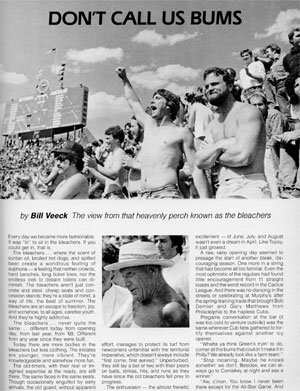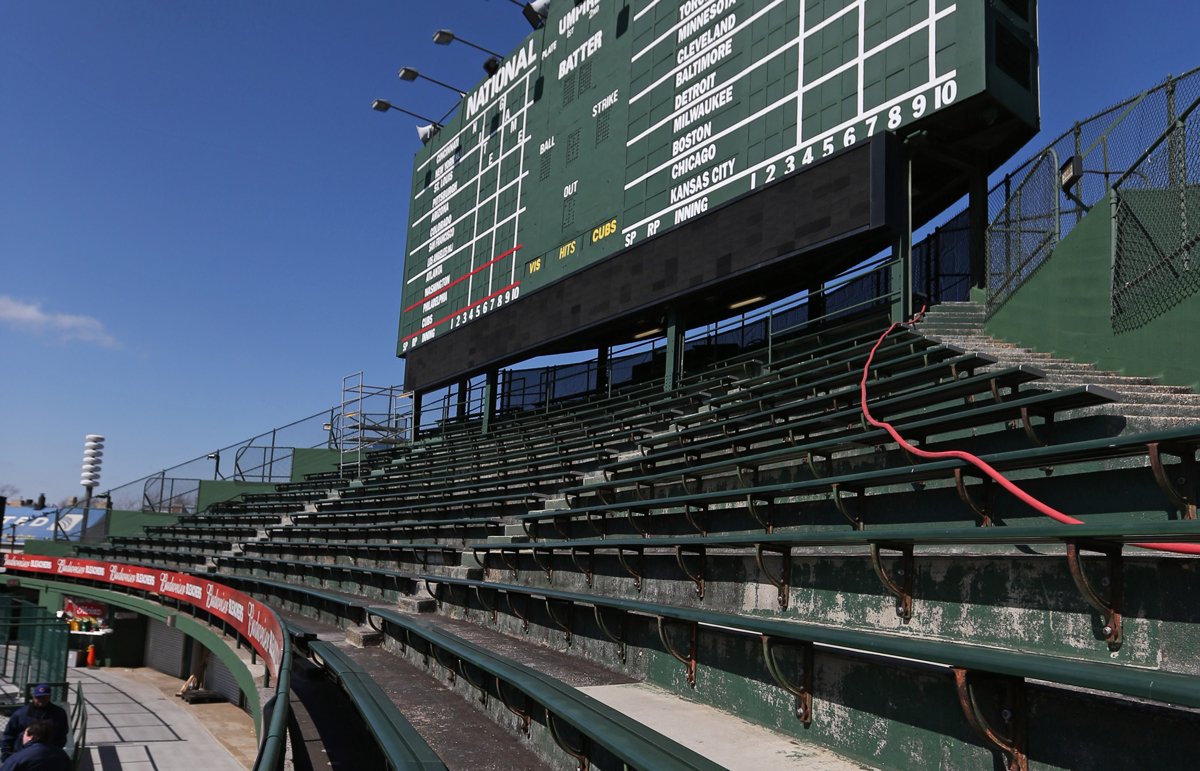Every day we became more fashionable. It was "in" to sit in the bleachers. If you could get in, that is.
The bleachers … where the scent of suntan oil, broiled hot dogs, and spilled beer create a wondrous feeling of euphoria—a feeling that neither crowds, hard benches, long ticket lines, nor the endless trek to distant toilets can diminish. The bleachers aren't just concrete and steel, cheap seats and concession stands; they're a state of mind, a way of life, the best of summer. The bleachers are an escape to freedom, joy, and somehow, to all ages, carefee youth. And they're highly addictive.
The bleachers … never quite the same … different today from opening day, from last year, from ’69. Different from any year since they were built.

Today there are more bodies in the bleachers but less clothing. The initiates are younger, more vibrant. They're knowledgeable and somehow more fun.
The old-timers, with their real or imagined expertise at the ready, are still there. The same faces in the same seats. Though occasionally engulfed by early arrivals, the old guard, without apparent effort, manages to protect its turf from newcomers unfamiliar with the territorial imperative, which doesn't always include "first come, first served." Unperturbed, they still lay a bet or two with their peers on balls, strikes, hits, and runs as they have since the old bleachers fell prey to progress.
The enthusiasm—the almost frenetic excitement—of June, July, and August wasn't even a dream in April. Like Topsy, it just growed.
A raw, rainy opening day seemed to presage the start of another bleak, discouraging season. One more in a string that had become all too familiar. Even the most optimistic of the regulars had found little encouragement from 11 straight losses and the worst record in the Cactus League. And there was no dancing in the streets or celebrating at Murphy's after the spring-training trade that brought Bob Dernier and Gary Matthews from Philadelphia to the hapless Cubs.
Pregame conversation at the bar (it was too cold to venture outside) was the same wherever Cub fans gathered to fortify themselves against another icy opener.
"Whatta ya think Green's tryin' to do, corner all the bums that couldn't make it in Philly? We already look like a farm team."
"Stop moaning. Maybe he knows somethin' we don't. Besides, we can always go to Comiskey at night and see a winner."
"Aw, c'mon. You know I never been there except for the All-Star Game. And even if we lost all 162 … and we might—there's always a first time for everything … I'm not about to start going there now."
"This Frey doesn't look like such a genius, either. Another Elia. He musta been at Philly some time or other. It's like that hamburger ad, only it's 'Where's the pitching?’ "
The opening-game post-mortem had a slightly wistful note of surprise.
"Somebody's started doin' something right. How about gettin' Trout to go all the way. But then, they always win the opener; that way, they're in first one time, anyhow."
By Memorial Day, hope had begun to filter into the bleachers. The Cubs were still hanging tough, sneaking into first place and falling out again. No one was taking things too seriously, of course. Not publicly. The North Siders often got off to a good start, and nobody wanted to get burned again, but. But you had to take Dernier and Ryne Sandberg seriously. They could play. Sandberg was the best since Billy Herman, and Dernier well, no one could remember when the Cubs had a guy in center who could catch the ball. Both could steal a base, and they were hitting. Especially Sandberg. He didn't look like the same guy that hit .261 last year. There was pop in his bat. He looked different, confident.
The one-two hitters were keeping the club in first place. No one could quite figure where the pitching was coming from, but it was about then that we grudgingly began to admit that maybe Green's deals weren't too bad, especially after Bull Durham drove in six runs with two homers to beat the Braves 10-7. That was when we decided we didn't miss Billy Buck—hardly at all. And being a farm team might not be half bad if you kept on winning like this.
By early June, the regulars were having to come out early to get their seats. Even on weekdays. And school wasn't out. At first they mumbled something about "the good old days" and then laughed at themselves and kidded one another. Vendors didn't have time now to sit down and pass the time of day. Vaguely familiar faces started coming up the ramps as the semiregulars from years past began showing up. Even some slightly sheepish-looking gentlemen in three-piece suits wandered in at the three-o'clock games. It didn't take them long to shed their coats and vests, then shirts and ties. A few even found shorts and Cubs caps in their attaché cases. Word was getting around.
With school out and June "busting out all over," the fans in the bleachers stopped hoping and started believing … tentatively at first. It didn't pay to talk about it too much. It was too early. This wasn't exactly superstition … not exactly. But—well, outsiders wouldn't understand. They'd think we were nuts, and then probably start talking about ’69.
Then it happened. On June 23rd, of sainted memory, in the ninth inning against St. Louis, it started the doubting Thomases heading for the hills. Not in full flight, maybe. But to the tried-and-true bleacherites, it was THE turning point, THE SIGN, when Ryno hit a homer in the ninth to tie the game … off Bruce Sutter. And then another in the tenth off Sutter … and they won 12-11. That day, the Cubs went into first place, and somehow we privately knew they would stay there. As privately, that is, as was possible in a sold-out bleachers suddenly gone berserk.
The next day, Rick Sutcliffe gave us a little assurance when he shut out the same Cardinals on five hits. All at once, Joe Carter and Mel Hall became a couple more baseball cards you could use to trade. Dallas Green's biggest gamble had played off.
All of a sudden, the soft-shoe dance at Murphy's was a little different as we all grabbed for the bandwagon.
"It took some guts to stick a mortgage on our future like he did."
"Yeh, but we been playing 'tomorrow' for 40 years and it still hasn't gotten here. Not till now. I told you he knew what he was doing. Remember?"
Summer. The lines formed early, three abreast along the wall on both Sheffield and Waveland. The red-haired kids were out parking cars at the Red Top lot across from the gates. Novelties were moving at the stands outside the park. They were running out of Cubs souvenirs on the weekends. It wasn't like last year when it was all Sox stuff, even on the North Side.
The night people stretching and yawning, families toting lunch boxes, students out for an athletic seminar with their T-shirts touting academia from MIAMI U. to WILLAMETTE. Now the benches began to fill with true believers. Ladies and gentlemen who could pass the "regular" attendance test, chiming in with Harry Caray's imaginary rhythm as he sang at the seventh-inning stretch.
On August second, the last vestige of doubt disappeared when Pete Rose hit a game-tying carom shot off Lee Smith's shoulder into a game-ending double play. Destiny had spoken … shouted. The Cubs were in. It was a question of when, not if. Cub fans from everywhere, even the Sky Boxes at Comiskey Park, came out of the closet and headed for the bleachers at Wrigley. The August double-header with the Mets sold out at 9:30, and when the Cubs won two, nobody wanted to leave—ever.
Something new and wonderful happened every day. A new hero was appointed and anointed. Ron Cey today, Jody Davis tomorrow. Then it was Matthews's, Henry Cotto's, George Frazier's, or Tim Stoddard's turn.
In a strange way, however, the end was almost anticlimactic. The superlatives were tired out from overuse. Emotions were temporarily drained. Now it is tickets, not base hits, the fans in the bleachers worry about. We know that the Cubs can't survive if we aren't in our usual seats. It doesn't matter if customers of customers or friends of friends of NBC's advertisers crowd into the boxes. It's the bleachers that count. Modestly put … we're inspirational and irreplaceable.



